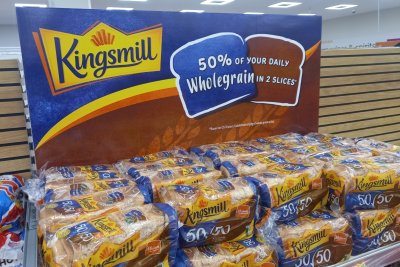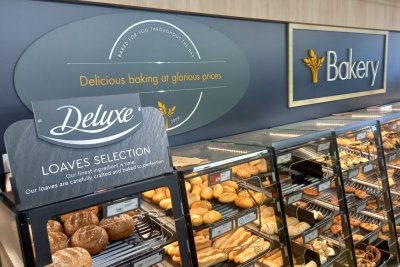Is Kingsmill’s whole grain claim legit?
Real Bread Campaign coordinator Chris Young questions the honesty and legality of Allied Bakeries’ claim.

As part of the Real Bread Campaign’s mission to find and share ways of making bread better for us, better for our communities and better for the planet, we advocate people eating Real Bread that is higher in dietary fibre. We also fight for legal, honest and transparent labelling and marketing, so that people have the chance to make better-informed buying choices and are not misled.
We have become aware that Allied Bakeries is marketing Kingsmill 50 / 50* with prominent use of the claim ‘50% of your daily whole grain in 2 slices’ The small print notes that the promise is ‘Based on US Dietary Guidelines of 48g of whole grain a day.’
Presumably the company is using the ‘healthy halo of wholegrain’ in this way to steer people into buying (and even paying a premium for) this loaf by creating a perception that it is ‘healthier’ or otherwise ‘better’ than other products.
Our main questions about this can be summarised as:
- How has Allied Bakeries / Kingsmill done the calculations to substantiate the ‘50% of your daily whole grain’ claim?
- Why has Allied Bakeries / Kingsmill chosen Dietary Guidelines for Americans as the basis of a marketing claim, rather than official dietary guidance applicable to people the UK, where the company sells this product?
The following is based on the email that we sent to the company on 15 April 2025.
*A half-white, half-wholemeal, Chorleywood Process, UPF industrial dough product manufactured by Allied Bakeries.
Fact checking
To meet the ‘Healthy U.S.-Style Dietary Pattern’ recommendations laid out in the Dietary Guidelines for Americans (DGA), an adult with an energy intake of 2200kcal a day needs to consume at least 3.5 ounces (approx. 99g) of whole grains per day.
According to the headline figures on the Kingsmill website, an 800g loaf of 50 / 50 is 34% wholemeal flour and each medium loaf contains an average of 20 slices. This would mean that each 40g slice contains 13.6g of wholemeal flour, which equates to 27.2g in two. This is closer to a quarter than a half of the DGA’s 99g guideline. On the ingredients list, the company states that the product is only 33% wholemeal flour, in which case the shortfall is even greater. If somehow Kingsmill was able to prove that two medium slices of 50 / 50 had 48g of whole grain (as the company claims) that would still be less than 50% of the DGA’s 99g guideline.
Assuming Kingsmill was able to prove that two slices actually contained 49.5g of whole grain, the 50% claim would only be true for people in the UK with an energy intake of up to 2200kcal a day, but the company does not state that caveat anywhere. NHS guidelines for an average adult man / woman in the UK is an intake of 2500kcal / 2000kcal per day. Even at 49.5g whole grain in two slices, the 50% claim would be untrue for every average adult man following that guideline energy intake (and even those 300kcal below it); and untrue for average adult women whose intake is just 200kcal (or more) above the 2000kcal guideline amount.
Incidentally, as the product name implies (and the ingredients list confirms), half of the flour in a 50 / 50 loaf is highly-refined white. The DGA states ‘the limit for refined grains is to be no more than half of total grain consumption’, meaning that anyone eating other refined grain products on the same day as Kingsmill 50 / 50 would need to eat the same quantity of whole grains to offset the refined grains.
Regulation 5 of The Consumer Protection from Unfair Trading Regulations 2008 states that 'A commercial practice is a misleading action if [...] it contains false information and is therefore untruthful [...] or if it or its overall presentation in any way deceives or is likely to deceive the average consumer [...] even if the information is factually correct; and (b) it causes or is likely to cause the average consumer to take a transactional decision he would not have taken otherwise.'
Retained Regulation (EU) No 1169/2011 on the provision of food information to consumers requires that ‘food information shall not be misleading, particularly: (a) as to the characteristics of the food and, in particular, as to its nature, identity, properties, composition, quantity...
Health and nutrition claims
The ‘50% of your daily whole grain’ claim implies that Kingsmill 50 / 50 has beneficial nutritional properties and / or that health benefits can result from consuming it. Retained Regulation (EC) 1924/2006 on nutrition and health claims made on foods demands that such a claim can only be made if it is on the Great Britain Nutrition and Health Claims Register. We have been unable to find any permitted claim on the register that includes the term ‘whole grain’.
We asked the company: can Allied Bakeries / Kingsmill point to it? If so, can the company also point to the legislation that permits the DGA to be used as the basis of a health, nutrition, or other marketing claim for food sold in the UK?
Potential alternative claims
If Allied Bakeries / Kingsmill is unable to demonstrate that its ‘50% of your daily whole grain’ claim is truthful and can legally be used in the UK, we asked the company to advise its timescale for removing it from product packaging, the Kingsmill website, in-store displays, and all other marketing.
Despite our ongoing lobbying, there isn’t yet a legal (even a generally accepted, unofficial) definition of the term whole grain / wholegrain in the UK. As such, we urged the company to remove this potentially confusing term from its marketing, and instead just use the word wholemeal on the ingredients list, as permitted by The Bread and Flour Regulations and required by The Food Information Regulations.
We suggested to Allied Bakeries / Kingsmill that possible alternatives to accompany, or replace, the company’s existing ‘source of fibre’ claim include ‘contains 1.9g of fibre per slice’ for the medium loaf. Based on Government Dietary Recommendations issued by Public Health England, another option might be ‘12.7% of your recommended daily dietary fibre in 2 slices’, though Kingsmill's marketing department might not think that figure isn't as sexy as 50%...
[If the product is 33% wholemeal flour (rather than the 34% in the company’s headline claim) these figures would need to be adjusted downwards accordingly.]
Updates
24 April 2025: Having still not received answers from Allied Bakeries, we emailed again to ask when we could expect them. A Consumer Care Advisor replied later that day:
'We refer to the official US dietary guideline for wholegrain intake as there is no UK equivalent. Thank you for your suggestion to use an alternative fibre claim but unfortunately this is not permitted as there is no authorised labelling reference intake for fibre in the UK.
We base the calculation on the US 2,000 calorie intake pattern because it aligns with the UK Front of Pack Labelling Reference Intakes which are based on 2,000 calories. All EU and UK labelling references are based on this calorie intake.The amount of wholegrain recommended for this calorie pattern is three ‘ounce equivalents’ of wholegrain/day (which equates to 48g wholegrain/day).
The Whole Grains Council has set out the explanation of this as follows What is an Ounce Equivalent? | The Whole Grains Council “A wholegrain serving is EITHER one ounce (28g) of a 100% wholegrain food in its ready-to-eat form OR the amount of food containing 16g of wholegrain ingredients”. We have worked on the wholegrain ingredient content, so the target is three x 16g i.e. 48g and this is cited on pack.'
As Allied Bakeries gave no indication the company would be amending or removing the claim, we submitted trading standards and Advertising Standards Authority complaints.
15 April 2025: We recieved an auto response from Allied Bakeries that said: 'We always aim to get back to you within 48 hours but it’s usually much sooner.'
Published Tuesday 15 April 2025
Real Bread Campaign: Finding and sharing ways to make bread better for us, our communities and planet.







